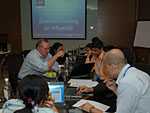CDC Influenza Division Co-Hosts Writing Workshops In Bangkok, Nairobi and Seoul
International Program Highlight
An important step in conducting scientific research is writing and reporting study findings. Clear reporting of influenza-related study findings helps guide policy development, program planning and outbreak response.
This year the Influenza Division co-hosted a series of three four-day-long writing workshops in Thailand, Kenya, and the Republic of Korea. The intent of the writing workshops was to help cooperative agreement recipients write about their work and ultimately to help them share their important findings with the public health community.
The three writing workshops followed a similar approach that mixed lectures with time to work on revising the draft manuscript that each student had started prior to the meeting. The students learned how to compose the different parts of a scientific manuscript (abstract, introduction, methods, results, and discussion), how to present data clearly and concisely, how to organize references, and how to determine what scientific journal would be most appropriate for their manuscript.
- The first writing workshop was held in Bangkok, Thailand in January 2011. Four CDC facilitators helped run the session, along with two instructors from the University of California, San Francisco. Eleven participants representing six countries brought influenza-related datasets and draft papers to work on at the workshop.
- The second writing workshop was held in Nairobi, Kenya in March 2011. Hosted by the CDC Kenya Office, the meeting featured eight mentors and twenty-five participants. The participants came from several African countries and worked for ministries of health, CDC programs in Africa, and Field Epidemiology and Laboratory Training Programs (FELTP).
- The third writing workshop was held in Seoul, Republic of Korea in April 2011. Co-hosted by the CDC and the World Health Organization – Western Pacific Regional Office (WHO WPRO), the meeting featured nine mentors and twenty participants from National Influenza Centers and ministries of health.
CDC field staff consider the writing workshops to be a great success.

Students and mentors collaborate at the January 2011 writing workshop in Bangkok; photo courtesy of Ms. Nilubon Sirisophon.
“The simple lectures were a great reminder about how to write a good scientific manuscript, for both participants and mentors,” says Sonja Olsen, PhD, Epidemiologist with Influenza Division and Influenza Program Director for Thailand Ministry of Public Health and CDC collaborative efforts, based in Thailand. “In addition, the dedicated course time for writing was critical for these busy public health and medical professionals. An unexpected benefit was that the exchange of papers exposed participants to all the important influenza work that is going on in the region.”
Jeff Partridge, PhD, an Epidemiologist who is based in the Philippines with the Influenza Division and who attended the workshop as a WHO WPRO representative, reflects on the workshop held in Seoul. “It was a really practical experience; most participants developed draft manuscripts by the end of the week. It was also a great opportunity for the mentors to meet with influenza colleagues from several countries and discuss their ongoing influenza work.”
The workshop attendees made significant progress on their manuscripts during and after the workshops. As of late October, one manuscript from the Thailand workshop was accepted for publication by a scholarly journal, while another ten manuscripts were under draft or were being cleared by the writers’ respective organizations. In addition, three manuscripts from the Republic of Korea workshop were submitted to journals, with thirteen more under revision.
Apart from providing host countries’ influenza experts with guidance on how to present their findings, the writing workshops this past year also served to support the Influenza Division’s goal of broadly sharing global influenza data. The sharing of this new data will assist in clearer understanding influenza in places that have not published data previously. With a better understanding of influenza activity and how it is impacting their communities, ministries of health can put policies in place for influenza prevention and control that may help to decrease morbidity and mortality associated with influenza.
“We hope that building field staff members’ confidence in publishing data may build recognition within countries for surveillance systems’ value and also serve as a springboard for future studies and publications,” says Ann Moen, Supervisor Health Scientist in the Influenza Division. “Ultimately, developing a sound surveillance foundation and ability to analyze and publish data may lead to more detailed studies on influenza burden. In addition, other studies may contribute to a better understanding of influenza in varied settings and also contribute to global policies for influenza prevention and control.”
- Page last reviewed: November 17, 2011
- Page last updated: November 17, 2011
- Content source:
- Centers for Disease Control and Prevention
- Page maintained by: Office of Associate Director of Communication, Division of Public Affairs


 ShareCompartir
ShareCompartir